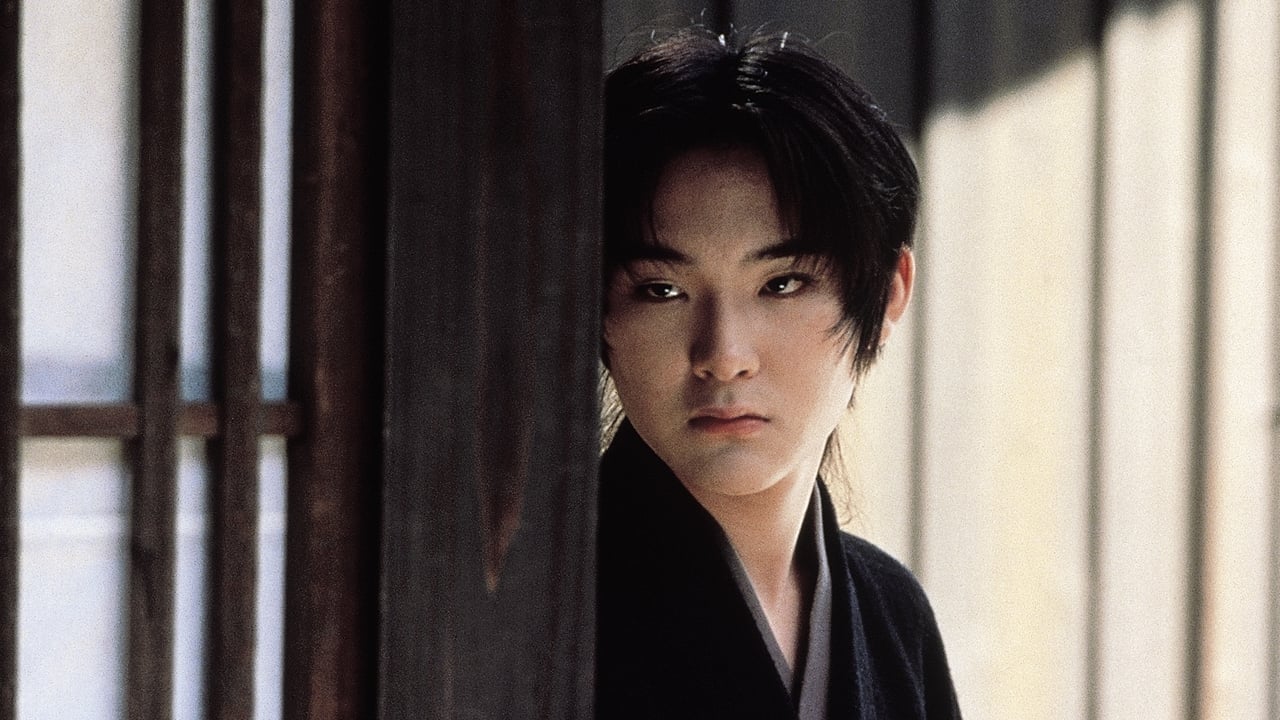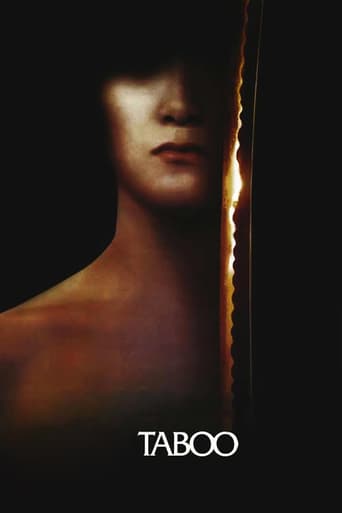Scanialara
You won't be disappointed!
Iseerphia
All that we are seeing on the screen is happening with real people, real action sequences in the background, forcing the eye to watch as if we were there.
Bea Swanson
This film is so real. It treats its characters with so much care and sensitivity.
Kirill Galetski
Japan in the 1860's was in a tense political situation with the Shogunate and the Emperor in conflict over whether to trade with foreigners. Though the country was still mostly isolated, the winds of change were in the air. Long-standing traditional institutions were withering away, and soon the supremacy of the samurai would give way to that of the merchant.Nagisa Oshima's newest film TABOO (GOHATTO) examines this socio-political decline on a personal level. The film, which was nominated for a Golden Palm at Cannes 2000 and won Best Film recognition at the St. Petersburg Festival of Festivals in St. Petersburg, Russia, is a truly riveting, yet exquisite film about homosexuality among Edo-period samurai. It is worth seeing for the simple, streamlined beauty of its images and its potent drama.Kyoto, Spring 1865. Hyozo Tashiro (Tadanobu Asano), a low-ranking samurai from the Kurume clan, and Sozaburo Kano (Ryuhei Matsuda), an effeminate 18-year-old rich man's son, join the Shinsengumi, a conservative samurai military unit loyal to the Shogun. Deceptively demure at first, the boy Kano quickly proves his acumen for killing when ordered to execute a wayward samurai. Tashiro, struck by Kano's feminine beauty and odd power, seduces him and they become butt buddies. Other men in the unit are also taken with Kano, and soon their bodies start piling up, murdered by a not-altogether-unknown assassin.The troop leader Isami Kondo (Yoichi Sai) and his second-in-command Toshizo Hijikata (the famed actor-director Takeshi Kitano) observe the situation and react to it differently. Kondo wants Sozaburo to pay with his life for his alleged transgressions, while Hijikata, who is as wise and merciful as can be within the samurai code of conduct, adopts a wait-and-see attitude.The most intriguing and surprising element in the film is how fairly tolerant of homosexuality the samurai leaders are, up to a point. The two commanders even discuss the subject with bemusement. When it becomes clear that the passions are running just a little too hot and threaten the cohesiveness and then the very integrity of the unit, then and only then is Hijikata galvanized into action. The last sequence of the film, when he makes his decisive move, is one of extreme grace and potent symbolism.Takeshi Kitano's performance is measured and calm. His character seems to have attained an inner peace that the others have not. Kitano puts a human face on a duty-bound samurai. He previously acted in Oshima's 1983 Japanese-British co-production MERRY Christmas, MR. LAWRENCE, playing a sarcastic sergeant in a Word War II P.O.W. camp who cracks jokes about homosexuality. Upon closer inspection, TABOO shares some striking similarities with that film. Both films take place in a military setting and deal with homoerotic themes. The two films are also outstanding in their exploration of the endlessly conflicting aspects of Japanese culture: prone to militarism and merciless brutality on one hand - aesthetically and spiritually attuned on the other. Oshima's images are colder, more austere and subdued (sub-dude?) in TABOO than in MR. LAWRENCE, but are also no less resplendent.
coyo
I adored it. I watched it four times in a row and I was squealing with happiness and bawling my eyes out at the end.I love the portrait of Sozaburo, or rather the LACK of portrait of him. Even though he's the main character he's only seen through other's eyes and you never know what he's thinking or planning.The other characters are bloody brilliant, too. I really feel sorry for Tashiro, the only character I really feel for throughout the movie. It's obvious from the start that he loves Sozaburo (there is a really cute scene where that is obvious but I'm not telling since that's a SPOILER). I also really enjoy how the generals are portrayed, the scenery, the symbolism (which a friend had to explain cause I didn't get it first time we watched it)...All in all, brilliant movie which everybody should see! Well, not people who have a problem with gay men, but everybody else should see it.
kaos-23
I happened to catch this film on BBC4 last night. My attention was immediately caught by the stunning Japanese setting, and as the film progressed, by the unusual storyline.This film is about the Shinsen militia: a group of samurai in shogun times. The story explores the homoerotic tensions between the men, as well as the conflict with another militia (group of samurai).In a way, not much happens in the film, but at the same time, it is fascinating from beginning to end. Takeshi 'Beat' Kitano gives an impressive performance as one of the older samurai, and in fact all the actors are very good.While the overall atmosphere of the film is quite dark, there are many funny moments which lift the mood. The humour is quite subtle - no slapstick here.The film is visually stunning, with wonderful use of light and colour to emphasise the mood of each scene. The Japanese mountains, lakes, and buildings look gorgeous.There are some moments in the film which are quite graphic, both sex and violence. However, this is not done in a gratuitous or grotesque way, and I didn't find it offensive.Overall, as another reviewer has commented, this film is somewhat cold. Despite the powerful events that happen in the film, they don't really emotionally involve you as a viewer. The film almost feels like a parable rather than a 'realistic' story.In summary, this is a gorgeous-looking film with an unusual subject matter, which is well worth watching.
kurai_hisui
If you're going to make a samurai film, I propose that you should have either 1. an engaging plot with interesting characters or 2. lots of wicked-cool sword fights (or ideally, both). Gohatto has neither. What it does have is cool outfits, and lots of men looking at each other longingly (both of which would be fine, if it also had either of the two criteria listed above).After seeing this movie and `Collage of our Life' in one weekend, I'm starting to rethink by formerly high opinion of Ryuhei Matsuda. Though it could just be the lukewarm performance by everyone else make his trademark 'malaise' outright bland. Even Beat Takeshi, who I thought would be perfect as Hijikata, looked like he couldn't care less about what was going on. Just about the only character that has any personality is Tashiro (Tadanobu Asano), who disappears for about 2/3 of the film. Everyone else is either a flat caricature (Okita smiles a lot, Inoue is old and inept), or just plain flat. Most of the film could have been done with finger puppets to similar effect.The plot is just as one-dimensional. The whole story takes place during the Bakamatsu, one of the most interesting episodes in Japanese history. Does Oshima use this fascinating period as a poignant backdrop for his drama, or at the very least an excuse for overdone swordfights to disguise the lack of a plot? No, we get these guys sitting around, making contrived references that sound like they're dictating footnotes for a history textbook. Other than that, the bloody struggle to determine the future of Japan is totally irrelevant to the plot. It could have taken place at an open minded country club.There isn't so much plot development as 'stuff happens'. There a guy, and someone dies, and there's this other guy, then it snows, and they have dinner quote history texts, and pine over the pretty-boy. These haphazard events are tied together by such brilliant transitions as a black screen with the words `Meanwhile' `One month later' `patience is rewarded'. Wow, riveting stuff. Why is Kano-the-cute such an efficient killing machine? What does he have against women? How does that life threatening head wound heal without even a scab? Who knows? There was one moment near the end when I went 'Oh, that's kind of interesting,' and even that little twist wasn't a big surprise.
I'd have no problem with a low key, psychological take on the Bakamatsu, or homoeroticism among the Samurai, if there was even one character in the whole movie I could have cared less about. And even the homosexuality is lukewarm ('Gee. I like the pretty-boy, gosh darn it'). On the other hand, the swordplay is beautiful (in a somewhat authentic way, not a Ryuhei 'Versus' Kitamura bloodfest way), as are the swords themselves (if you're into that kind of thing), but they're too few an far between to cover for the flimsy story. So there's really no reason to see this film at all, no matter what kind of movies you like. Unless you have a major interest in costuming and set design, or simply must see some samurai manlove.

